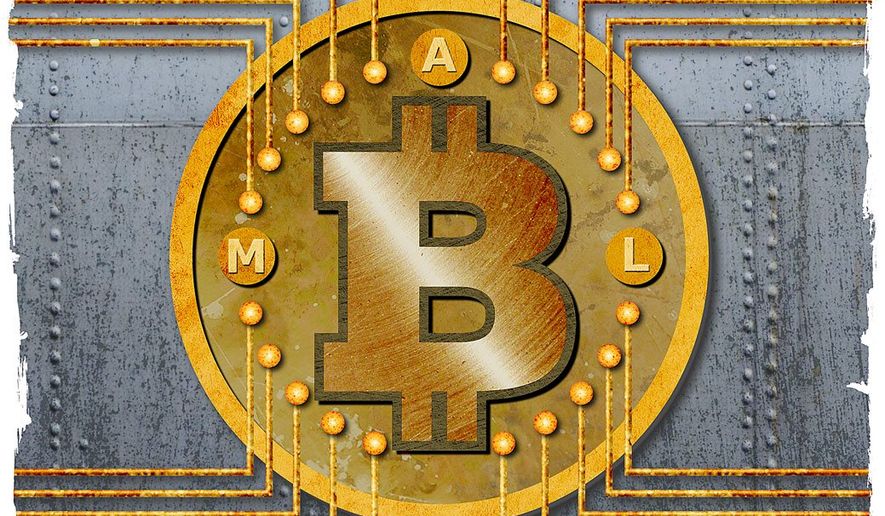OPINION:
Bitcoin is a digital currency that exists only online. The value of each bitcoin unit is set by supply and demand in market transactions every day, just like most currencies are today. Since it was launched in 2009, bitcoin has been celebrated, especially by libertarians as a freedom-enhancing innovation potentially freeing people from government control.
But this open-to-all-comers, private, online currency has been increasingly vulnerable to abuse by terrorists, drug dealers, money launderers and organized crime, because there is no one who can exclude them from trading in it, up until now. As reported in The Washington Times on Sept. 25 (“North Korean Hackers Suspected of Using Bitcoin to Undermine U.S. Sanctions”), financial analysts now fear North Korea may be starting to use bitcoin to evade sanctions designed to exclude them from global financial market transactions that may support their nuclear program.
But the newest cryptocurrency, launched Oct. 1, AML Bitcoin can close this loophole. AML stands for anti-money laundering Bitcoin. AML Bitcoin is designed to comply with the anti-money laundering, know-your-customer rules and requirements promulgated in the Patriot Act, which apply to all banking and financial institutions.
Those rules and requirements protect banking and finance institutions from invasion by those same terrorists, drug dealers and organized crime conspirators that effectively destroyed the usability of old bitcoin in mainstream commerce. Following those banking rules will protect AML Bitcoin as well, and enable it to serve customers operating in the established financial markets and mainstream commerce.
That is why AML Bitcoin has already made inroads in so many places where old bitcoin would never be welcome, such as the Port of San Francisco, which has already been in discussions with AML Bitcoin officials to enable use of their new digital currency in the seaport’s payment structures. That would include payment of seaport passage and docking fees, and payment to other institutions and enterprises buying and selling through the seaport.
The new, regulatory-compliant AML Bitcoin is now poised to spread as well to other major seaports up and down the West Coast, from San Diego to Los Angeles-Long Beach to Oakland to Seattle. Indeed, the breakthrough is going international, as AML Bitcoin officials have already been in Panama discussing payments with their digital currency regarding the international trade traversing the Panama Canal.
The AML Bitcoin creators are in Estonia this week discussing that country launching its own national digital currency on the AML Bitcoin platform. The new AML Bitcoin can operate perfectly well in all financial markets, serving all institutions, even establishment multinational corporations.
Because AML Bitcoin can operate globally in mainstream commerce, chatter among the digital currency investment and hedge fund world hints to a likely explosion in price for AML Bitcoin after its launch, as global demand overwhelms the early bitcoin supply. But self-enforcing bitcoin rules, for both old and new bitcoin, limit what can be recognized as bitcoin, and, therefore, the growth of bitcoin money supply.
All transactions in bitcoin, both old and new, are recorded by servers and personal computers, designated as bitcoin miners, on ledgers that are regularly updated and archived. Under a formula originally specified in the founding documents for bitcoin, new bitcoins are created with every ledger update. But the formula specifies that the number of new bitcoins created with each such update is cut in half every four years, until it reaches zero in 2140, when the total number of bitcoin units will reach their maximum quantity of 21 million.
That slow and steady growth in the AML Bitcoin money supply will assure a steady, stable value for AML Bitcoin, further enhancing its global appeal in mainstream commerce. The best course for government is to embrace and promote the global prevalence of regulatory-compliant AML Bitcoin. Markets would then join governments in driving out the old cowboy bitcoin, increasingly exploited by North Korea.
Nobel Prize-winning economist Friedrich Hayek espoused the concept of competing currencies to keep government issuers of currency like the U.S. Federal Reserve in check. Now that AML Bitcoin provides a digital currency that can be used in polite company the world over, it can demonstrate and fulfill Hayek’s vision of the virtue of such competing currencies, and how they can better support global investment, trade and economic growth.
• Peter Ferrara is a senior fellow at the Heartland Institute and a senior policy adviser to the National Tax Limitation Foundation.




Please read our comment policy before commenting.